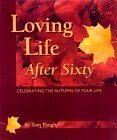After living sixty or sixty-five years people start doing weird things. They tend to move around a lot. Many buy and use house trailers and motor homes, enduring cramped conditions to seek new horizons. Mostly what they find is other trailer types and they compare notes. Some seniors choose ocean cruises with similar results. Still others devise various forms of travel to see the world or the country "while still young enough to enjoy it." Many, if not most, hike, walk, swim, jog, cycle, climb, swing golf clubs or tennis racquets or fly rods. The shared desire seems to be to achieve a state of almost perpetual motion. Action symbolizes life. Death is such a very long stillness. There seems to be a grim universal blind hope that it will be harder for the death dart to hit a moving target.
There is no cure for birth and death
save to enjoy the interval.
-- GEORGE SANTAYANA
Case #1 -- Sometimes death is a surprise. She was going along pretty good. She was being useful, helpful, unselfish. She had nothing but love in her heart for all mankind. And, she was taking good care of herself. For breakfast she ate bran cereal with sliced banana, no sugar, skim milk. No coffee. Glass of squeezed orange. She walked two miles and her legs and lungs felt strong. She looked at her husband of forty-five years and knew that their love for each other had only increased over that time. Her children were doing well and they had brought her three wonderful grand kids. The sun was shining as she lay down for a short nap that was to last for all eternity. There wasn't one person who knew her who didn't say or think, "What a shock. So sudden."
Case #2 -- Sometimes death is anticipated. Dying is an earthward process. First he had to give up jogging because of his knees. Eventually he had them replaced, but one of the operations was less than successful. Then he slipped on a newly mopped floor in the supermarket, and busted his hip. He wasn't seventy yet, too young for this crap. They put a pin in his hip but that didn't work out either and he and his devoted wife were dealing with a walker (that he used less and less) and a wheel chair (that he used more and more). With the reduced mobility he, who had always been so active, never seemed to feel exactly well. His energy was gone. His desires, sexual and otherwise, were gone. He wanted to feel better, but that seemed to occupy all of his thinking. It wasn't long before he had his first stroke. Therapy for stroke victims is difficult and calls for dedication, hard work, mental toughness. He seemed to stop caring. His right side was mostly paralyzed and he had trouble forming words and even thinking of once familiar phrases. He pretty much stopped communicating. Three months later he had his second stroke and three weeks after that it was all over. There wasn't one person who knew him who didn't say or think, "It's for the best. Now he can rest in peace."
The thing is, we don't really get to choose between Case #1 and Case #2. Fate chooses for us. We can attempt to impact our physical well being by following "doctor's orders" and what we learn from reading and watching, and talking with friends and associates, but our genes are pretty much in place and whatever future medical miracles are coming in that area will not be in time for us. A glance at the obit page offers the obvious clue that there is no escape. So like lambs being led to slaughter, we bide our time, wait patiently and, in most cases, bravely, for the inevitable. We even joke about it. We attend the funerals of friends and family. We weep and then we laugh. We proceed because proceeding everyday, day by day, is what human beings on the planet Earth have got to do. It's that one law of nature we cannot seem to alter.
When you top sixty and begin your perilous journey toward those bigger, scarier numbers, you begin to focus on the reality of your own demise and you may, at times, be quite overcome with self pity. At such moments I find it helpful to remember the fields of crosses and other markers in various parts of the world that represent young service people who left life early on the battlefields attempting to preserve the freedoms we enjoy today. They made it possible for us to experience sixty and beyond and to leave children and grandchildren. The young fighters died knowing only their youth, but also believing that there was no other way to preserve our precious way of life than to place themselves in harm's way. I think, if these young people had the courage to give up their lives, then who am I to be afraid now having lived life to its fullest? I am grateful to them and filled with awe at their sacrifice.
It's going to happen, we all know it. But is that any reason to be obsessed with death? As the saying goes, we're going to be dead a long, long time, so if we must be obsessed with something it would seem to make more sense to be obsessed with life. Some consider life to be short and sweet. Others believe it to be long and arduous. Actually, while life can seem long and arduous, the short, sweet moments can make it all worthwhile.
If they find the cures for all the various cancers there would certainly be cause for justifiable celebration. But eliminating one way to go, and a nasty way it can be, has absolutely nothing to do with eliminating death. Prolonging life is merely procrastinating death. What is a natural life span? If they do away with strokes and heart attacks and AIDS and lung, liver and kidney failures, death will still be there. If they ban guns and knives and poisons and bombs, death may wait, but not forever. If they stop all car accidents, snake bites, starvation, leaps from tall buildings, murders and hangings, it will make little difference in the long run. What begins, must end. What emerges from the nether world for its Earthly visitation, must, sooner or later, move on. Life often feeds on death, but death always has the last bite.
While death must be considered one of the most serious of all subjects, there is actually a great deal of humor surrounding it. This reflects the resilience of the human spirit, courage in the face of annihilation. It's called gallows humor. When they were young, Robert Benchley and Dorothy Parker of Algonquin round table fame, spent some time writing funny lines for tombstones. Two of the best were "This One Is On Me" and "Pardon My Dust." I found what I consider to be a good line for my own headstone on a tag attached to a pair of socks I purchased at a factory outlet store: "Slightly Imperfect."
Do not go gentle into that good night
Old age should burn and rage at close of day;
Rage, rage against the dying of the light.
-- DYLAN THOMAS,
Do Not Go Gentle Into That Good Night (1953)
For the most part, our children and grandchildren want us to hang on as long as possible, and we try to do that until something happens in our minds that tells us it's time to move on. At that moment our offspring represent a future that no longer includes us. Our thoughts turn backwards and we think of our mothers and fathers and friends who are dead but not gone from our minds. The living mix with the dead as we hallucinate. This brings great fear to our children, great peace to us.
Your death, my death, will leave behind an emptiness for those still living who loved us. They can dial the same number as usual; there will be no answer, ever. They will have to continue on without us to find their own destinies. I think often about my parents, long gone, but still clearly envisioned in my mind. I recreate the death of my 35-year-old son over and over, changing nothing. I count the years since his departure, years that mean nothing to him, but seem unreal to me. Death is permanent. The most we can hope to do is to prepare for death while we are alive so that our loved ones remaining on Earth will best be able to cope with the rest of their own lives. There is no proof that we will not all be together again. Something to cling to.
Given enough time, we come to understand how much time is finally enough. When your world shrinks down and you are your own last contemporary, your moment has arrived.
Under the wide and starry sky,
Dig the grave and let me lie.
Glad did I live and gladly die,
And laid me down with a will.
This be the verse you grave for me:
Here he lies where he longed to be;
Home is the sailor, home from the sea,
And the hunter home from the hill.
-- ROBERT Louis STEVENSON,
Requiem (1850-1894)
 This article is excerpted from the book:
This article is excerpted from the book:
Loving Life after Sixty
by Tom Paugh.
Reprinted with permission of the publisher, Willow Creek Press. ©2000. http://www.willowcreekpress.com
Info/Order this book.
About the Author
Tom Paugh was editor-in-chief of Sports Afield magazine from 1977 to 1994, when he retired. A graduate of Colgate University, he has been a USAF intelligence officer, a newspaper reporter, magazine columnist and feature writer, professional outdoor photographer and watercolor artist. In March, 1999 he turned 70 and he continues to write, paint and photograph. Along with Anne, his wife of 45 years, he divides his time between south Florida and northern Virginia.
























